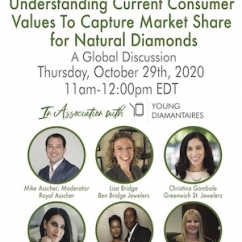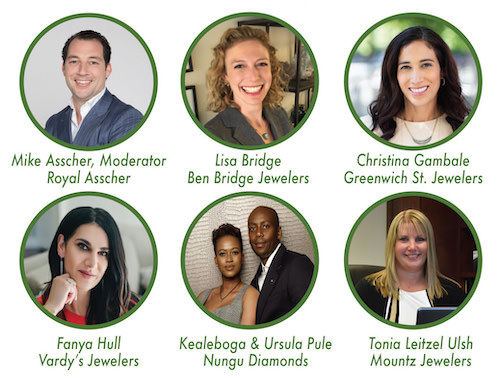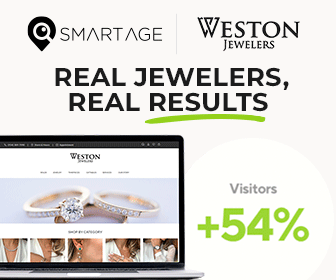Articles and News
Next-Gen Jewelry Retailers Talk About Current Consumer Values And What That Means For Business | November 02, 2020 (1 comment)

New York, NY—In the second of its Global Conversations series, Diamonds Do Good tapped leading young American jewelry retailers, along with global luxury brand leaders and young diamantaires, to discuss how consumer values have changed and what that means for business.
The virtual event, held October 29, featured “next-gen” retailers from both the independent and chain sectors. Retailers on the panel includedLisa Bridge, president and CEO of Seattle-based Ben Bridge Jeweler, Christina Gandia Gambino, CEO of New York City-based Greenwich St. Jewelers, Fanya Hull, CFO/Co-Owner Vardy’s Jewelers in Cupertino, CA, Tonia Leitzel Ulsh, president/COO of Mountz Jewelers in Harrisburg, PA, and Ursula & Kealeboga Pule, Creative director and founder, respectively, of Nungu Diamonds, a black-owned diamond cutting and polishing firm in South Africa.
Mike Asscher, co-president of Antwerp-based Royal Asscher Diamonds and a member of sponsoring organization Young Diamantaires, moderated. He began with Kealeboga and Ursula Pule’s success in South Africa’s diamond industry.
Kealeboga Pule: People need to know the good diamonds do. It needs to be demonstrated, not just talked about.
Ursula Pule: There’s a perception that South Africa and diamonds are negative. We want people to see the entire value chain and see that it does good for miners, for the city, for the polishers.
Mike Asscher: Christina, you had such a beautiful way of speaking of the Four Cs.
Christina Gandia Gambale: The world is facing many challenges and those are being pulled to the forefront of consumer behavior. I think about the Four Cs as being facts about diamonds, but there’s room for another C and that’s Conscience. We can connect diamonds with all the good they’re doing in giving back to the community.
Asscher: Lisa, can you talk about all the things happening during COVID which inspired you to do more for your community?
Lisa Bridge: It’s been a period where it’s really important to focus on our values. Who we are and what’s guided us to get here because I think that’s going to take us into future. For us, community is one of our pillars; both local and the greater community. Caring for our team, but also what opportunities can we take to move forward.
We had a number of our stores damaged during the looting and protests [following the death of George Floyd]. We had to board up about 15 our stores, but we used that to engage in civic conversations, and we took that wood afterwards and donated it to Habitat For Humanity. It was taking what was a challenging moment but finding opportunities for immediate change and using those tools for greater good.
Fanya Hull, CG, AJP, is CFO and co-owner Vardy’s Jewelers. “We’ve been building the business from scratch since my family came to the USA in 1980 with nothing. Now we want to give back to the community, both local and greater Silicon Valley. It’s part of who we are and in our DNA.”
Tonia Leitzel Ulsh, president and COO of Mountz, echoed Hull’s thoughts. “Giving back is the basis, the foundation of our business. For our business to survive, the community needs to thrive.”
Recently, the jeweler stepped up to help the local Salvation Army, which is helping support working parents whose kids are home during the pandemic. The local Salvation Army is offering a space with cubicles for kids kindergarten to 12thgrade to come in and study, and they try to give educational support so their parents can continue to go to work.
“You don’t realize how this has affected all different levels and different people in different ways. We need to support everybody out there who can come back and support us,” said Ulsh.
Asscher: What strategies do you use to reconnect with consumers?
Hull: We never sold online. We had a beautiful website and we never used it, but within two weeks’ time we had prices and credit card processing and we sold online. We were shut down for about nine weeks. After that, we hired a fulltime social media manager and we’re able to completely sell online and we have someone in-house full time managing online. This is the new norm. You can’t go back.
K. Pule: There was a gay wedding in South Africa with huge hoopla around it. We made beautiful wedding bands and a had lot of social media content, but the message was the good diamonds do: that young black South Africans now are making a decent living in the diamond business. We sell not just the four Cs but the Fifth C, Consciousness. The wedding played multiple times on multiple channels, amazing content on TV for people stuck at home and one that’s benefited our business quite extensively.
U. Pule: One of gentlemen in the couple is an icon in South Africa. The rings represent how jewelry does good for you and others, not just “I want another and another.”
Gambale: We’ve been in business almost 42 years and this is the second time [we went through a major crisis]. We went through 9/11, and were completely destroyed. We had to move and we were closed nine months. My mother said, “You can do this.”
Now, I understand what everyone is going through on global level. We had to furlough everyone except our marketing team keeping social media alive. [My sister] Jennifer and I had to pause and re-evaluate our purpose. People were happy to support someone supporting social justice efforts. What good is that purchase goes beyond the gratification we’re giving ourselves.
Asscher: That leads me to the next question. How do you see social purpose in your business? And post-COVID, what did you change or not change?
Bridge: I’m fifth generation in our business. My great-uncle had a plaque on his desk saying ‘Service is the rent we pay for the space we occupy on earth.’ The two things are intrinsically linked. We’ve always done good because we believed it’s right thing to do.
We hadn’t shared much [of the good we do] because we weren’t looking for a pat on the back, but we realized that consumers are looking for what we’re doing, so we’re needing to share that in a bigger way and bring it to the forefront. Customers do care very much about how shopping with. People want to shop with people who share their values. So it’s really important that we share the good we’re doing. We share across the counter, on our website, and social media. We encourage others to join us.
Ulsh: Our family has been in the business over 70 years; we’ve had Mountz over 40 years. When we first reopened, we were so excited to bring employees back but our employees were out in the community making a difference the whole time we were closed. They were delivering meals and making masks for those that couldn’t get masks.
We recognized 40 people who inspire us by what they do in their community; who do good but don’t ask for recognition. We found 40 people who do a lot of good and we gave back to them. It made everybody feel good, and we see the downflow to employees and they do the same thing. We’re all in this together, and need to try to make everything better and improve the horrible time we’re navigating and make something good come of it.
Asscher: All of us in family businesses were taught by those came before us. It’s in our DNA. Once it’s ingrained in you and you see difference you can make by buying and owning diamonds and passing them down generationally, it’s like the idea of giving back and doing good. But how do you get that message out and get consumers into stores?
Gambale: We’ve really embraced Instagram in the last six months. Consumers are really on Instagram more than your website. We ask how people found us, and seven out of 10 times it’s Instagram. We really put emphasis on social media.
K. Pule: When you’re stuck in traffic and have no idea what to do, you open Instagram. You’re stuck in queue, open Instagram. So we created engaging content. There’s nothing better to look at than diamonds! We’re consistent with posts, we have a message, not just the beauty of a piece but also the why behind the purchase. Purchasing diamond jewelry is an experience. Last year had 600 Instagram followers, now we have 27,000. Now we know how we post, when and what.
U. Pule: You have to have direction. Pre COVID, it was fun to piggyback on the wedding but after COVID we were forced to sit down and have a plan. You can put up wedding jewelry, but people are not having weddings. It has to have a message and inspire people. How do you put meaning into a caption without it being frivolous? Some people are losing jobs and struggling and you’re saying ‘buy jewelry.’ You can’t do that. Words we always repeat are provenance, substance, and authenticity. It has to be genuine.
Asscher: There’s been the impact of lab-grown diamonds in our market. Can you talk about that?
Gambale: We don’t sell lab-grown but we do set them. What I find in clients with them is they get more for less, but when we talk to them about story of the good [natural] diamonds do, they see that they have an opportunity to connect story of a diamond to their story and pass it on. They start to understand the value of diamonds beyond what’s in front of them, more than just the stone. It’s building on their story, not just fabricating it.
Bridge: Diamonds are really important in stories that connect people. The good they do around the world is incredible. In local communities as well as around world. Right now, we have an opportunity because there’s more interest in diamonds. People aren’t traveling to celebrate occasions, they’re turning to diamond jewelry to celebrate those occasions instead.
It’s our chance to communicate how powerful diamonds stories are. Building a connection to diamonds and the great good they’re doing is going to drive us into future and the next generation of diamond consumers.







